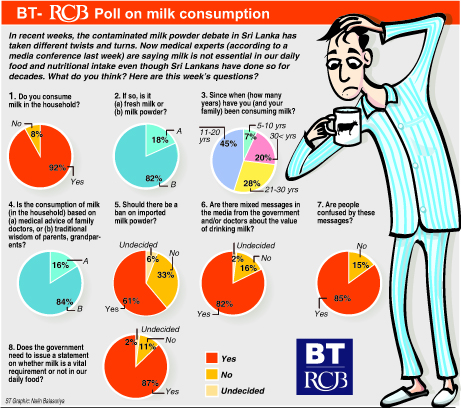Govt.-doctors’ messages on milk confusing, poll shows
View(s):Most Sri Lankans drink milk and believe the government and sections of the medical profession are responsible for confusing signals on the consumption of milk, a Business Times –Research Consultancy Bureau (BT-RCB) poll found this week.
The poll was conducted on the street and by email with over 800 respondents and, asked whether milk is consumed by the household, more than 90 per cent of the respondents said YES.
To another question on whether milk consumption is based on medical advise or traditional wisdom, more than 80 per cent of the respondents opted for the second (traditional wisdom). The poll was held amidst a fountain of confusion and mixed messages on the safety of milk and whether milk should be consumed at all. A group of doctors last week said milk need not be an essential part of the daily food intake. “It is interesting that the GMOA (Medical Officers’ Association) has got involved in an issue that has nothing to do with perks or salaries or administrative issues,” one respondent said, adding that the government has also lost credibility on the milk issue.
The majority of the respondents said they use milk powder at home. Many said they have been consuming milk for many decades in the household. The response to whether there should be a ban on imported milk powder was slightly mixed with 60 percent opting for a ban.
There was widespread agreement that there were mixed messages in the media from the government and doctors on the value of drinking milk and that people were confused by these messages.
Such was the confusion over the milk issue that one respondent commented that ‘someone is making a fast buck out of the confusion.”
Another said imported milk powder should be stopped only once Sri Lanka is self-sufficient in milk.
On the street, respondents polled by RCB said the milk powder issue is a new problem created by the government. “The reason is to hide the government’s faults and to shift the focus of the people to some other direction,” one office worker said.
Another asked why the government was ‘getting excited only now’ when milk powder has been imported for decades. “Without even manufacturing milk powder here in a big way, stopping the import of foreign milk products all of a sudden is not right,” another respondent noted.
comments powered by Disqus

